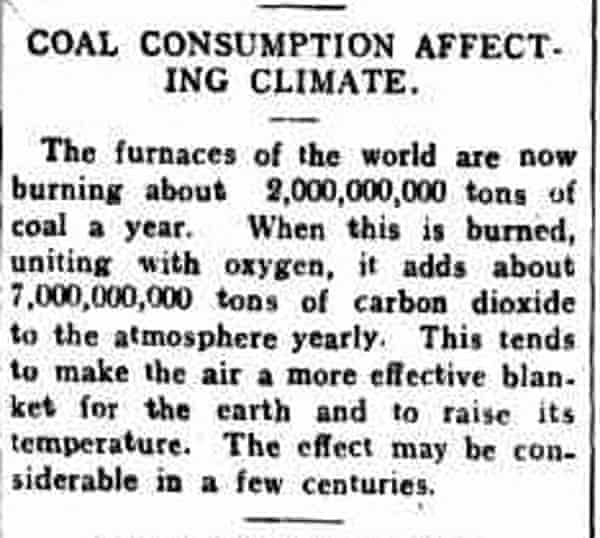Beyond Google: my afternoon trawling Trove for the first mentions of climate change | Libraries | The Guardian
https://amp.theguardian.com/...-my-afternoon-trawling-trove-for-the-first-mentions-of-climate-change
Science has uncovered indisputable evidence that the level of our oceans is rising. This is the result of a sudden and unexpected increase in our planet’s northern temperatures. Ice masses are melting rapidly away. If the rate of thawing continues, civilisation near the sea may be submerged and profound changes be wrought in climate, soil, sea and the race itself. The whole face of the earth may be moving towards a vast transformation.”
That’s quite an opening paragraph, but it’s not mine. It belongs a story titled “Sea Levels Rising” published in the Central Queensland Herald on Thursday. Thursday 30 September 1948.
...
I wanted to try to track down the earliest reference to climate change in Australian papers. First, because I could. But second, because I wanted to know how long we had known this is coming. Over the last black summer I was overwhelmed with fatalism, with the sickening sense that we had been warned. Now I wanted to find out for how long we had known.
But I thought I was stretching when I entered the search term “climate change” and set the search parameters for newspapers published between 1930 and 1950. I expected there might be some records of floods, droughts or heatwaves, but nothing equivocal. Then the results came up. I gasped. Loudly.
Climate Change: World is Warming, Courier-Mail, Monday 22 May 1950
There were more.
Whole Earth Seems to be Warming Up, Courier-Mail, Friday 6 June 1947. The Arctic is Melting Says Scientist, the Argus, Saturday 31 May 1947. World’s Climate Hotter, the World’s News, Saturday 16 March 1940. World Changing Climate – Scientists Puzzled, Courier-Mail, Friday 21 April 1939. Carbon Dioxide. Could Change the World, Townsville Daily Bulletin, Tuesday 25 July 1933.
These are not headlines misread by contemporary understanding. This is reporting of climate change as we understand it today, albeit in its infancy and with uncertainty over whether that change was all bad.
It was clear I’d have to go further. I searched the 19th-century newspapers. There were sporadic articles talking about drought, and how some old colonialists had remembered different weather decades before, but there was nothing about climate change as a phenomena separate to individual memory and musing.
there, tucked away on page 4 of the Picton Post, between one report about a new skipping machine that not only turns the rope but counts the skips and another about Swiss engineers boring a tunnel through the Caucasus Mountains, was a one-paragraph story:
“Coal Consumption Affecting Climate”. From Wednesday 17 July 1912.
At nearly precisely 108 years old, it looks to be quite possibly the first general audience warning on human-induced climate change in Australia. The coal burning in the world’s furnaces, says the snippet in the regional paper, adds 7,000,000,000 tons of carbon dioxide to the atmosphere yearly. “This tends to make the air a more effective blanket for the earth and to raise its temperature. The effect may be considerable in a few centuries.”
